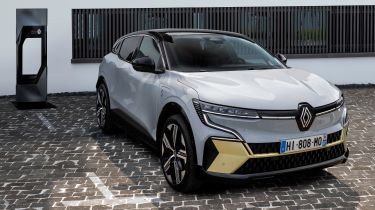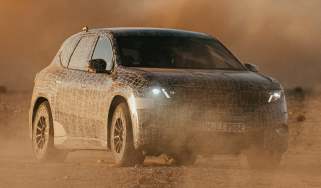Renault and Dacia seek petrol and diesel car ban extension to 2040
Renault Group’s director of engineering believes hybridised combustion-engined cars could still have a place beyond 2030, offering affordable mobility for many motorists

Groupe Renault’s executive vice president for engineering, Gilles Leborgne, will seek an extension on the European-wide ban on cars with some form of combustion engine until around 2040, in a bid to keep offering affordable vehicles as the industry pushes towards more expensive all-electric models.
He told Auto Express at the Munich Motor Show that, “We will fight in order to keep hybrid alive after 2034, 2035, because [in the current EU proposal] we have a full ban of internal combustion engines. It’s not said like that, but it’s zero-emission by 2034, so translated it means no ICE.
“We do think it’s not the right approach so we will fight to propose a smoother way of doing things, to have a proportion of hybrid until I would say 2040.”
The main reason for the extension request in Renault’s eyes will be financial, helping ensure consumers can still afford new vehicles. Of all the brands under the Groupe Renault umbrella, it’s the more value-focused Dacia that would be in line to continue with ICE production.
“It depends on the brand – Renault will be 90 per cent full electric by 2030, 100 per cent for Alpine, but for Dacia it will be in the range of 10 per cent BEV, but we will have a lot of hybrid, because our strategy is simple, we build Dacia only on the CMF-B platform.
“We can bring all of the technologies from Renault to Dacia no problem. We are doing that already; look at the Sandero. But of course, because of the cost of the car we will wait until it’s absolutely necessary to do it. For Dacia it will be a nice and gentle move. We will keep petrol and LPG, then we’ll move to mild hybrid (48 volt) and hybrid, then to full electric.”
Leborgne believes there are three main reasons for extending the ICE ban to 2040, covering both the business case and in the interests of buyers.
“Firstly, we want to link the rate of battery cars that will be mandatory [to sell] to the infrastructure. Number two, we no doubt have the technology, but we don’t know if we have the customers for it yet. Third, we need to adapt – we have a lot of people in our factories; we have to transform our people, and that will take time. We don’t want to have a big rejection of the direction; we are ready to move for the sake of the planet.”
Renault’s engineering and research and development exec did offer a word of balance though, highlighting that; “I want to be clear: I’m not against it [electrification]. I am not pushing back. We are saying that, because it’s a proposal from the European Commission, it has to go in front of parliament, and we have to take care of the people. We have to take care of our people, and the freedom for mobility. That’s the point.
“It means affordable cars, because people need to move and they need to have affordable cars – and to have affordable cars we are working like hell to reduce the cost of BEV, but nobody today can ignore the fact that you have extra cost with battery-electric vehicles.
“Renault Group, Renault brand and Dacia, we are popular. Because of that we need to make mobility affordable. That’s our role. We were the first to move, but we need to take care of everyone, to keep their right for mobility.”
Should Renault’s request for an extension of the 2030 ICE car ban to 2040 be granted? Have your say in the comments…
Find a car with the experts






